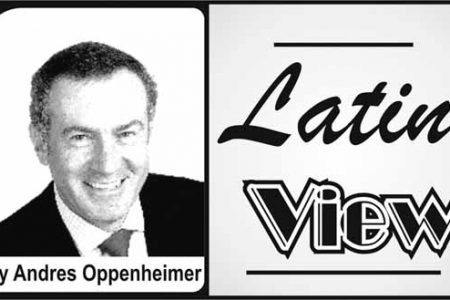
Mexico’s new (but old) anti-corruption fix
After a series of corruption scandals, Mexico has created a government-backed National Anti-Corruption System that—to my surprise—is getting good reviews from some leading independent anti-graft groups.

After a series of corruption scandals, Mexico has created a government-backed National Anti-Corruption System that—to my surprise—is getting good reviews from some leading independent anti-graft groups.

PANAMA CITY — The handshake between President Barack Obama and Cuban ruler Gen Raúl Castro was not the only symptom of changing political winds at the 35-country Summit of the Americas: Much of the region showed signs of ideological fatigue and a new yearning for pragmatism.

PANAMA CITY — We’ve known for a while that Venezuelan President Nicolás Maduro was planning to stage an anti-US show at this weekend’s Summit of the Americas in Panama, but a copy of the draft final declaration of the meeting that I obtained this week shows that he will seek much more: a formal, region-wide condemnation of the United States.

While US and Latin American officials say that Venezuela’s political crisis should be solved through upcoming legislative elections, recent testimony before the US Senate raised many questions: It said Venezuela’s voting registry includes the names of so many dead, many states have more registered voters than people.

US Senator Ted Cruz’s announcement that he is running for the Republican presidential nomination is great news for Democrats: He will push the other Republican hopefuls to the right on immigration, further scaring away Hispanic voters and making it more difficult for Republicans to win next year’s elections.

Brazilian President Dilma Rousseff’s political troubles are growing by the day following a March 15 anti-government protest that drew much bigger crowds than expected — about 1.5 million people nationwide — and new corruption charges against key members of her ruling Workers Party.

The big question about the US sanctions on seven top Venezuelan officials accused of human rights violations is not whether they deserve them — of course they do — but whether the measure won’t give Venezuelan President Nicolás Maduro a golden excuse to usurp even more powers and further clamp down on the opposition.

While much of the world’s attention on Latin America is focused on Venezuela, there is a slow-motion political and economic crisis in a much bigger country — Brazil — that could have far greater regional consequences.

Judging from the shamefully weak response from Latin America’s regional organizations such as the OAS and Unasur to the arbitrary arrest of Caracas Mayor Antonio Ledezma and other opposition leaders in Venezuela, it’s hard not to conclude that they have become mutual protection societies for repressive regimes.

While Latin American presidents meet in regular summits that usually end with grandiose declarations vowing to dramatically increase economic integration, several little-noticed reports paint a very different picture: they show that trade within the region is falling fast.

Two recent bomb scares close to the Israeli embassy in Uruguay and the mysterious departure of an Iranian diplomat found close to one of the fake bombs are raising new suspicions about Iran’s terrorist activities in Latin America.

The recent history of oil-rich Venezuela should be taught in universities around the world as a textbook case of an economic miracle in reverse: despite having benefited from the biggest oil boom in recent history, the country has managed to be poorer.

The recent visit by three former Latin American leaders to Venezuela has not only helped draw attention to their assertion that the region’s democracies have “abandoned” Venezuela, but has shown that former presidents can play a larger-than-expected role in pushing for democracy in Latin America.

Argentine prosecutor Alberto Nisman made headlines before his mysterious death last weekend by accusing President Cristina Fernandez de Kirchner of trying to cover up Iran’s role in the 1994 AMIA bombing in Buenos Aires, but there was another — more important — leader who was at the centre of the deceased prosecutor’s probe: Iran’s President Hassan Rouhani.

The official reaction of Venezuela, Argentina, Ecua-dor and several other Latin American countries to the Islamic radicals terrorist attack against the French magazine Charlie Hebdo was not only weak, but shameful; they condemned the bloodshed but not its intention to silence the press.

Here are a few little-noticed actions that experts agree Latin American countries should take in 2015 to improve their innovation, science, technology and education systems, which are rated very poorly in international rankings and are key to their economic future.

The start of 2015 finds Latin America turned into a leaderless region, in which the countries with the biggest political clout in recent years — Brazil, Venezuela and Mexico — have been significantly weakened by domestic troubles.

One of the big questions following President Barack Obama’s decision to significantly expand US tourism to Cuba will be how much it will affect other Caribbean tourism destinations such as the Dominican Republic, Jamaica or Cancun.

While President Barack Obama’s announcement Wednesday that he will normalize relations with Cuba is the biggest diplomatic breakthrough with the island after six decades of hostilities, his speech may have been less “historic” than he portrayed it, according to numerous US congressional sources and Cuba experts.

Reading a Gallup Poll about the happiest countries on earth, I couldn’t help being surprised by the fact that nine out of the 10 happiest countries — led by Paraguay — turned out to be in Latin America.
The ePaper edition, on the Web & in stores for Android, iPhone & iPad.
Included free with your web subscription. Learn more.